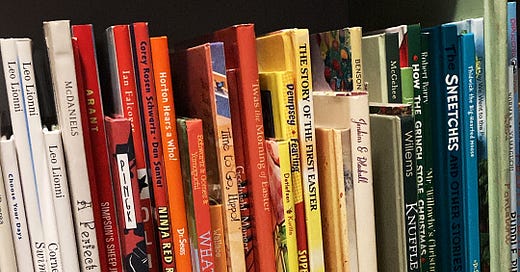When I first set out to become a published children's book author, one "rule" about writing for children that everyone seemed to agree on was this:
Don't write a story to teach a lesson.1
I saw this everywhere, and for good reason. Nobody wanted preachiness in a picture book. Nobody wanted to read a heavy-handed moral lesson disguised as a children's story. Nobody liked it when a fictional story about forest critters had an obvious political or social agenda. Those things were annoying. They were unnecessary. They didn't give the reader any credit for being a person with a working brain.
Of course, every now and then an annoyingly didactic picture book made it past security, sometimes even becoming a huge best-seller (I’m looking at you, Pinkalicious). But for the most part, preachiness was discouraged. And that was a good thing.
Then something changed after November, 2016. From my perspective, the children’s book community seemed to be in a state of panic after the United States’ presidential election. Suddenly, there was doubt that subtle children's books had the power to do what we always believed: foster understanding, inspire kindness, teach empathy, encourage curiosity, empower young minds!
And because of this nagging doubt, this growing fear that children were going to be unduly influenced by a regressive culture and bigoted parents, children's books changed.
Subtlety was no longer an option. Universal appeal was no longer good enough. If a book didn't spell out its all-important lesson, readers would miss it. Children wouldn’t be brave unless they were told they could be. They wouldn’t be kind unless they were told they should be. They wouldn’t learn how to welcome the stranger unless a character in a picture book learned a really obvious, heavy-handed lesson about prejudice.
Maybe I'm being a little unfair. After all, there are lots of well-written, engaging, fun books with universal themes being published that aren't preachy. But, the preachy picture book is far more common than it used to be. I discover at least one new one every time I visit the library. And what's worse is that these books are often praised as timely and/or poignant rather than being criticized for their heavy-handedness.



And it needs to stop.
Children aren't clueless, and they have parents and other adults in their lives who actually want them to grow into competent, compassionate, kind-hearted, hard-working adults. Adults who have empathy, who are good stewards of the earth, and who are strong enough to overcome whatever obstacles come their way.
Children’s fiction can help with those things. But the books that do this best aren't the ones that tell the reader what to think. They are the ones that tell a story for the story's sake, and let the reader figure out the rest.
Give children and their parents some credit. They have brains. They have feelings. They have everything they need to work out the deeper meaning of a story. They don't need authors to spell it out for them. They don't need authors to make sure they get it.
They need authors to tell good stories.
So let's get back to doing just that.
Sketch of the week:
This is not referring to books with a stated educational purpose, such as nonfiction books or concept books with narrative arcs. See Facts vs. Opinions vs. Robots by Michael Rox or Do Unto Otters: A Book About Manners by Laurie Keller for good examples of those.







THIS IS SO TRUE. I hate those books (and my kids do too!😂)
Ugh, yes! I have the hardest time finding books at the library for my kids that are just as you describe -- good stories. They all have the over-the-top lessons. It drives me nuts!